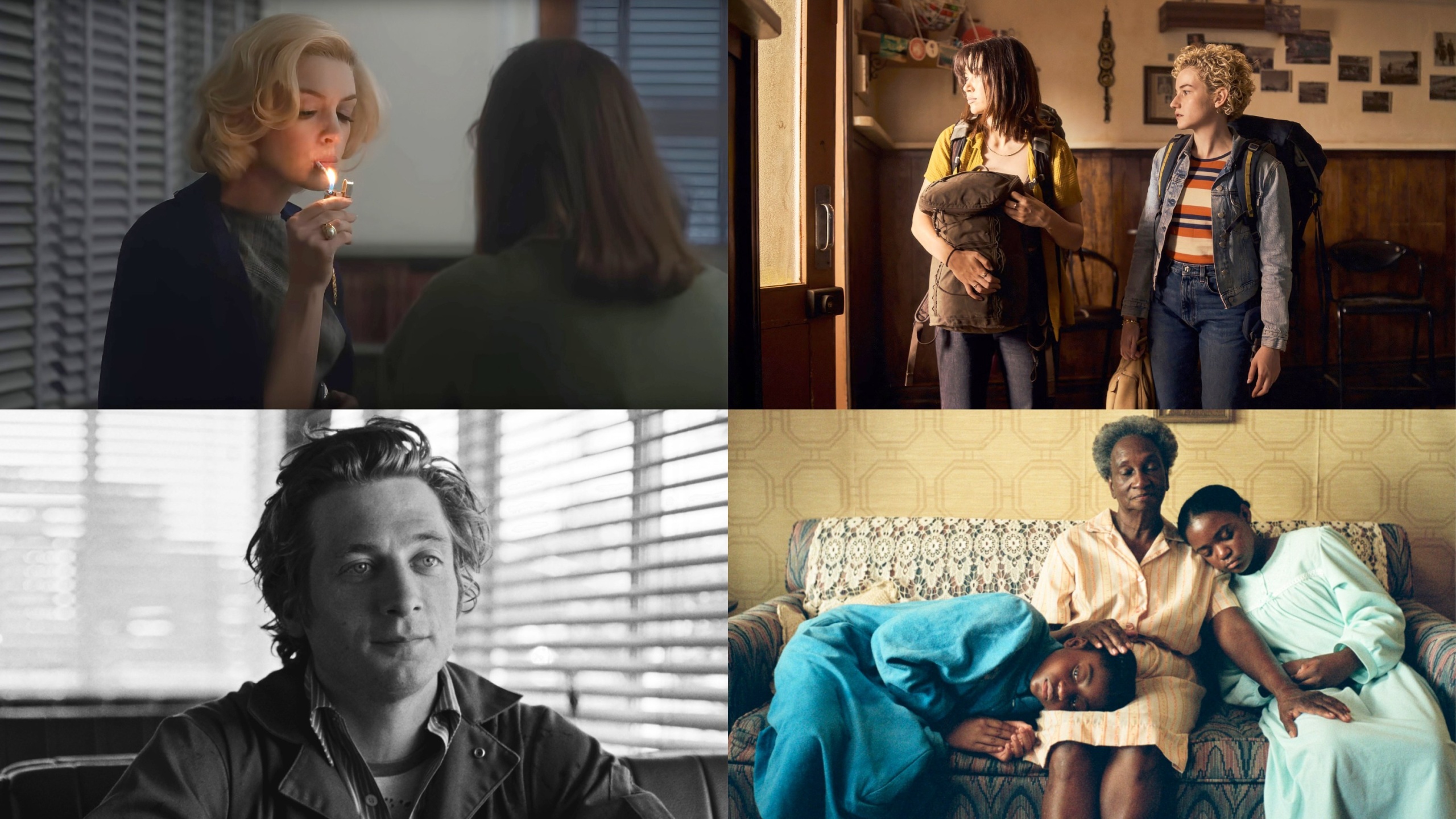 The year-end crush to deliver timely best-of lists as voters across guilds and other blocs scramble to fill out their own ballots means plenty of films will end up left out or even unseen. That’s especially true of independent films and especially true of indies released way earlier in the year. Indies getting plenty of exposure so far this season include Celine Song’s “Past Lives,” the belle of the ball since premiering at Sundance back in January 2023, Cord Jefferson’s TIFF People’s Choice Award winner “American Fiction,” Todd Haynes’ Netflix premiere “May December,” Ira Sachs’ love triangle “Passages,” and Andrew Haigh’s Christmas release “All of Us Strangers.”
The year-end crush to deliver timely best-of lists as voters across guilds and other blocs scramble to fill out their own ballots means plenty of films will end up left out or even unseen. That’s especially true of independent films and especially true of indies released way earlier in the year. Indies getting plenty of exposure so far this season include Celine Song’s “Past Lives,” the belle of the ball since premiering at Sundance back in January 2023, Cord Jefferson’s TIFF People’s Choice Award winner “American Fiction,” Todd Haynes’ Netflix premiere “May December,” Ira Sachs’ love triangle “Passages,” and Andrew Haigh’s Christmas release “All of Us Strangers.”
As much as IndieWire loves all these films, plenty more deserve your attention and from under the radar — even the film that won the Dramatic Grand Jury Prize at Sundance 2023, “A Thousand and One,” up for Film Independent Spirit Awards but curiously missing from a lot of year-end coverage. Any year where indie films find a means to success is a triumph when up against the onslaught of big-budgeted franchises that themselves crib indie talent to build their worlds in the first place. Getting an indie film off the ground is always a challenge, no matter the circumstances or names or dollars behind it, and any indie director who’s dipped their feet into the studio space and gone independent again would tell you the same thing.
Below, we’ve rounded up 25 great overlooked indies from 2023 you shouldn’t sleep on.
-
“32 Sounds”

Image Credit: Courtesy Everett Collection Shortly after the invention of the phonograph in 1877, a prominent newspaper of the time predicted that Thomas Edison’s machine was powerful enough to stop death itself. The human body was still ephemeral, but the human voice had effectively become immortal. It was now capable of being heard long after the person who produced it had decomposed into nothing more than bone and memory.
When AI broke into the mainstream some 150 years later, tech websites almost immediately began reporting about new digital tools that allow people to upload audio recordings of their loved ones in order to keep talking with them after they’re gone.
That development is a bit too recent to be included in “A Thousand Thoughts” and “The Weather Underground” director Sam Green’s “32 Sounds,” but it provides a perfect coda to this soft and semi-interactive documentary about the ambient power of acoustic vibration; to a scattershot TED Talk of a film that is somewhat counterintuitively obsessed with death, but only because the ephemeral nature of life on Earth offers the best evidence of sound’s power to connect us to the universe more strongly than any other sense. Read IndieWire’s full review.
-
“All Dirt Roads Taste of Salt”

Image Credit: Courtesy Everett Collection A whispered symphony of sense memories that cycles through the decades like rain water — heavy with images and ambient sounds that trickle down from the generations above before they’re absorbed into the earth and suffused back into the air — the vague but vividly rendered “All Dirt Roads Taste of Salt” runs a little drier every time writer-director Raven Jackson loops back to squeeze another drop of meaning from the textures and traditions that connect a Black Mississippi woman to the place where she was born (and vice-versa). Read IndieWire’s full review.
-
“Blue Jean”

Image Credit: Magnolia Pictures As difficult as it can be to look back at less accepting times in queer history, it’s even more painful how relevant it remains. Though “Blue Jean” — an acutely felt lesbian drama set during Margaret Thatcher’s regime — takes place over 30 years ago, 1980’s England could easily stand in for any conservative state today. Set against a backdrop of rising anti-gay sentiment and pending legislation, “Blue Jean” tells a political story through one woman’s strained attempts to straddle two worlds. Featuring a stirring breakout performance from the luminous Rosy McEwan, “Blue Jean” grounds the political with the personal — without losing sight of queer joy. Read IndieWire’s full review.
-
“Cassandro”

Image Credit: ©Amazon/Courtesy Everett Collection Saúl Armendáriz’s inspirational life story had previously been told by director Roger Ross Williams in his 2016 documentary short “The Man Without a Mask.” Later, the 2018 non-fiction feature “Cassandro, The Exotico!” tackled not only his rise to fame but the bodily injuries he sustained over nearly three decades of fights. This year’s fabulous retelling, “Cassandro,” Ross Williams’ first narrative outing, stars an irresistible Gael García Bernal as the real-life amateur luchador from in El Paso, Texas turned unexpected beacon of change. Read IndieWire’s full review.
-
“Divinity”

Image Credit: Courtesy Everett Collection Eddie Alcazar‘s “Divinity” offers an alternative point of view. Pulling liberally from 1950s B-movies, film noir, porn, stop motion, and advertising, the black-and-white mindfuck of a film imagines a world where our insistence on running from the inevitabilities of nature has robbed us of the one reason we actually have for existing. Produced and “presented” by Steven Soderbergh — whose omnipresence in the film’s marketing materials is a perfectly valid price to pay for such a bold piece of art getting made in the first place — it’s one of the most exciting midnight movies of 2023. Read IndieWire’s full review.
-
“Earth Mama”

Image Credit: Courtesy Everett Collection Learn the names Savanah Leaf, first-time feature filmmaker, and Tia Nomore, first-time feature actress, right now, because their debut film “Earth Mama” is a shimmering stunner. A former Olympic volleyball athlete, Leaf has a canny eye for locating the subversion and beauty within a welfare-system drama about a single mother fighting for her life and children. What sounds, on paper, like a challenging sit is actually a wondrous 97-minute feature, whose director and star are obviously poised for greatness. Read IndieWire’s full review.
-
“Eileen”

Image Credit: Courtesy Everett Collection In the first scene of “Eileen,” the protagonist stakes out in her car on a dreary winter lakefront lovers’ lane in the Boston outskirts. As another couple makes out in a backseat of the next car, Eileen watches, glowering lustily, and grabs a handful of muddy snow, shoves it down her pants, and masturbates.
The rest of “Lady Macbeth” director William Oldroyd’s second feature never quite matches the giddy perversity of that image, but no matter, because this stylish 1960s-set noir adapted from Ottessa Moshfegh’s mean and pungent novel of the same name is a dark treat throughout. Thomasin McKenzie, playing the title character, and Anne Hathaway, playing the alluring blonde-headed woman that seemingly drops from the sky and into her life, give career-best performances in an oddly touching queer almost-romance that feels like a cross between “Carol” and Hitchcock (Moshfegh herself has named his film “Rebecca,” which shares a name with Hathaway’s character here, as a touchstone). But it’s also entirely its own weird, beautiful thing, even if it doesn’t quite rub audiences as deeply in the muck of Eileen’s miserable existence as the novel did. Read IndieWire’s full review.
-
“Fremont”

Image Credit: Courtesy Everett Collection A black-and-white portrait shot with Jarmuschian streaks of droll humor — but also laconic enough to make the similarly quotidian “Paterson” feel like a James Cameron movie by comparison — Babak Jalali’s “Fremont” is a Barstow-dry comedy that never rises above the volume or intensity of the Vashti Bunyan song that Donya’s co-worker Joanna (Hilda Schmelling) sings for her one night. Read IndieWire’s full review.
-
“Memory”

Image Credit: Ketchup Entertainment Michel Franco‘s “Memory” is in the tradition of movies about broken people coming together, with all the heartbreak and melodrama required.
But “Memory” bucks the tradition of the cold films previously made by the director of the apocalyptic 99-percent-uprising thriller “New Order” and high-school bullying drama “After Lucia.” They’re films that seem calm at the outset, but you wait for the other blood-dipped shoe to drop. That shoe never quite hits the ground in the peculiar and sensitive “Memory,” which stars Jessica Chastain as a 13-years-sober alcoholic who reconnects with a former school classmate, Saul (played by Peter Sarsgaard), at a reunion she doesn’t want to be at anyway. Read IndieWire’s full review.
-
“Of an Age”

Image Credit: ©Focus Features/Courtesy Everett Collection The simple yet effective title “Of an Age” plays a few tricks with its double entendre; the peppy romance about a young queer man’s first brush with love captures a certain glowing youthful nostalgia. But it’s also a story split across two decades, essentially bifurcated in two recent but now solidly bygone eras. The film opens in 1999, though the boxy cars harken even further back, and ends in 2010, performing some impressive movie magic to make the actors look age-appropriate. That the entire thing is set in Melbourne, Australia, adds another layer of distance to the whole affair, coating it in a kind of dewy faraway melodrama. Read IndieWire’s full review.
-
“Other People’s Children”

Image Credit: Courtesy Everett Collection A coming-of-age character study about a woman already of a certain age, Rebecca Zlotowski’s “Other People’s Children” feels, to put it bluntly, delightfully French. And that goes beyond the outer trappings, the Paris setting, the opening shot of the Eiffel Tower glittering in the night sky, or the countless dimly lit, book-lined apartments where the film’s characters enjoy wine and cigarettes, toasting to the pleasures of sophisticated adulthood. Read IndieWire’s full review.
-
“Palm Trees and Power Lines”

Image Credit: Courtesy Everett Collection Lea knows the difference between wrong and right. Wrong: the way dudes treat her mom. Wrong: her friends running out on their bill at a local diner. Wrong: getting into a strange man’s truck. But, as has forever been the human condition — and in the case of Jamie Dack‘s uncomfortably honest “Palm Trees and Power Lines,” the teenage human condition — knowing is only half the battle, and Lea (a breakout Lily McInerny in a remarkable first feature role) is about to endure quite a battle indeed. Dack, making her feature film debut by expanding her 2018 award-winning short of the same name, uses a familiar tale to shed new light on the coming-of-age drama, and while many of the film’s beats are predictable, that often speaks to the discomfiting universality of the story at hand. Read IndieWire’s full review.
-
“The Peasants”

Image Credit: Courtesy Everett Collection “Loving Vincent” was a dreamy plunge into the art of Vincent Van Gogh, which directors D.K. Welchman and Hugh Welchman created via tens of thousands of oil paintings, each frame of the animated film a full-size work on canvas you could hang on a wall. They’ve said that they’re always asked, “When are we getting ‘Loving Vincent II’?” As in, another animated film about another artist rendered in that artist’s style. Instead, the wife-and-husband directorial team swerved and delivered something infinitely more ambitious, if commercially more challenging. Their long-awaited follow-up is “The Peasants,” a sensuous, richly immersive adaptation of Nobel laureate Wladislaw Reymont’s early 20th-century novel about life in a rural Polish village. D.K. Welchman is Polish (“Loving Vincent” is technically the highest-grossing Polish film of all time at the international box office), and she reconnected with Reymont’s novel while listening to it on audiobook when she was creating oil paintings for the previous film. Read IndieWire’s full review.
-
“Polite Society”

Image Credit: ©Focus Features/Courtesy Everett Collection For her first feature film, “We Are Lady Parts” creator Nida Manzoor weaves a hyper-creative coming-of-age tale about (pause to take a big breath): fighting the patriarchy, gut-punching feminine expectations, “The Matrix,” Islam, martial arts, family dynamics, high school dynamics, fresh-pressed juice, romance, friendship, forced leg waxing, possibly evil hybrid alien babies, diplomacy, computer hacking, and one seriously cool convertible. At its heart, Manzoor’s stuffed-to-bursting “Polite Society” asks one haunting question: What happens when your best friend opts to take her own life path? Read IndieWire’s full review.
-
“Rotting in the Sun”

Image Credit: Courtesy Everett Collection Sebastián Silva has suicide on the brain in “Rotting in the Sun,” his eighth directorial feature and one in which he also plays himself. Sebastián is living in Mexico City, running out of money, addicted to ketamine, and bereft of creative ideas. But he faces a new, potentially soul-eroding opportunity when flippant gay internet persona and content creator Jordan Firstman enters the frame. Firstman also plays himself in a performance that interrogates his image as a contemporary queer icon while also mocking it — in ways self-aware and also not — in this raunchy, sexually explicit lambasting of gay male life whose target audience will both revile and revere this film. Read IndieWire’s full review.
-
“The Royal Hotel”

Image Credit: Courtesy Everett Collection ollowing 2019’s deeply unnerving “The Assistant” with another razor-sharp Julia Garner collaboration, Australian filmmaker Kitty Green has decided to strand her favorite actress in one of the few places on Earth more dangerous for a young woman than Harvey Weinstein’s production office: A shithole bar on the border of an ultra-remote mining town so deep within the Australian outback that no one there has even heard of the #MeToo movement. Welcome to “The Royal Hotel.” Read IndieWire’s full review.
-
“Rye Lane”

Image Credit: ©Searchlight Pictures/Courtesy Everett Collection As the rom-com still gasps for air in the blockbuster landscape, the Sundance Film Festival has become a reliable source for small, distinctive entries into the genre, from “Obvious Child” to “Palm Springs.” This year, the festival’s lineup yields the delightful “Rye Lane,” which takes a simple premise and infuses it with warm performances and a distinct sense of place.
In Raine Allen-Miller’s debut feature, the two will-be lovebirds first encounter each other in a loo at an art show — he’s sobbing — and embark on a day of skirting responsibility and negotiating their own heartbreak. At just 82 minutes, Allen-Miller’s film is short, but packed to the brim with her affection for her characters and the place in the world they occupy, the South London neighborhood of Peckham. Read IndieWire’s full review.
-
“Sanctuary”

Image Credit: Courtesy Everett Collection A sharp and silly and deliriously romantic single-location saga about a hotel chain heir (Christopher Abbott) who’s blackmailed by his long-time dominatrix (Margaret Qualley), Zachary Wigon’s “Sanctuary” unfolds like a kinky cross between “Punch-Drunk Love” and an off-Broadway play. The results are delightful and exasperating in almost perfectly equal measure until a last-minute hail Mary ends the movie on such a high that even its hoarier stretches seem like they were worth the walk in hindsight. Read IndieWire’s full review.
-
“Scrapper”

Image Credit: ©Kino International/Courtesy Everett Collection From Pitsea railway station in south-central Essex, around 15 miles from London, you can get to a lot of places. Trains go to industrial port Tilbury further south, seaside paradise Southend to the east (admittedly: my home), and of course the Big Smoke a few minutes west. Georgie (newcomer Lola Campbell), a 12-year-old girl motoring through the stages of grief since losing her mom to an unspecified illness, couldn’t care less. The cookie-cutter estate where Georgie lives, all alone, is everything she needs. Debutant director Charlotte Regan and DP Molly Manning Walker make it feel like all Earth is there. Georgie’s self-contained world matches up with a fierce self-sufficiency. Her primary caregiver, aside from fictional uncle “Winston Churchill,” is Georgie. Even with Britain’s notoriously stretched public services, children are not supposed to live alone. Read IndieWire’s full review.
-
“She Came to Me”

Image Credit: Courtesy Everett Collection Rebecca Miller makes romances. And comedies. And dramas. With character studies still beholden to crazy plots, she’s covered everything from drug addiction to infidelity, incest to ambition. A Rebecca Miller film means releasing expectations, eschewing glossy images and tidy plots, and embracing the mess inherent in life itself. Her films are wild, dreamy, sad, funny — and not at all realistic.
That’s certainly the case with “She Came to Me,” which follows a loosely connected group of people all made absolutely crazy by love. Miller delights in toying with what sounds like a cutesy concept, stretching it to wacky (and occasionally wonderful) ends. It may be most closely aligned with her previous film, the 2015 “Maggie’s Plan” (it also poked at the idea of modern romance), but it shares some of the concerns she mined in her debut “Angela” and its belief that religion offers some sort of purity for those who really dedicate themselves to it. Read IndieWire’s full review.
-
“Skinamarink”

Image Credit: ©IFC Films/Courtesy Everett Collection A micro-budget phenomenon that leveraged a fortuitous leak into the kind of buzz that an indie film can’t buy, Kyle Edward Ball’s deeply unnerving “Skinamarink” might be too indebted to YouTube horror trends to feel like a sui generis genre-changer, but this is still the sort of movie so committed to its own strange language that it’s best translated through references to more familiar work. If the final product amounts to a fucked-up tone poem rather than a full-cooked meal — an inscrutable, 100-minute nightmare that proves its own concept at the expense of developing it further — that uncompromised sense of experimentation also helps to demonstrate how vital horror movies can be at a time when the rest of the film world is too scared to try anything new. Read IndieWire’s full review.
-
“The Starling Girl”

Image Credit: Courtesy Everett Collection Laurel Parmet’s “The Starling Girl” tells a tale as old as time — the broad strokes of its story about the affair between a naïve teenage girl and a married older man who swears that he’ll leave his wife adhere to convention from start to finish — but the power of this sensitive and devilishly detailed coming-of-age drama is rooted in the friction that it finds between biblical paternalism and modern personhood. While young women have always been taught to be ashamed of their desires (hot take!), Parmet’s self-possessed debut is uncommonly well-attuned to how garbled that gospel might sound to a God-loving girl who’s been raised amid the echoes of a secular culture. Read IndieWire’s full review.
-
“A Still Small Voice”

Image Credit: Courtesy Everett Collection A raw and lucid observational documentary about people whose life’s work is making space for death, Luke Lorentzen’s “A Still Small Voice” watches — sometimes from a distance, and sometimes at a bracing closeness — a young Jewish chaplain-in-training named Margaret “Mati” Engel as she offers spiritual care to the sick and dying at New York City’s Mt. Sinai Hospital. Read IndieWire’s full review.
-
“A Thousand and One”

Image Credit: ©Focus Features/Courtesy Everett Collection There are two bruising lines that bookend first-time feature director A.V. Rockwell’s “A Thousand and One,” a vivid portrait of Harlem life from the early 1990s to the mid-2000s.
“There’s more to life than fucked-up beginnings,” Inez, a woman living life in New York on her own terms and brilliantly played by R&B super-artist/actress Teyana Taylor, tells her young son Terry (Aaron Kingsley Adetola). She has kidnapped him out of the foster care system, which has kept them separated after her stint in Rikers Island beginning in 1993, and now hopes to give him a better life. But at the end of the movie, after a decades-spanning, bittersweet bond forms and fizzles between them and shattering revelations are had, she tells the older Terry (Josiah Cross), “I fucked up. Life goes on. So what?” Read IndieWire’s full review.
-
“You Hurt My Feelings”

Image Credit: Courtesy Everett Collection Filmmaker Nicole Holofcener has long been one of our foremost chroniclers of the minutiae of everyday life, someone uniquely equipped to marry the very funny with the very honest, the sort of creator who makes things that hurt, in both good and bad ways. For her first original feature in a decade — she’s been making plenty of TV in recent years, and in 2018, directed and scripted the Ted Thompson adaptation “The Land of Steady Habits” — Holofcener returns to classic territory: a New York City story about neuroses and good intentions and the slights that keep us at night. It’s, of course, about love. Read IndieWire’s full review.



